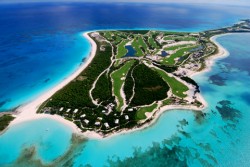
U.S. scientists claim the reef on Great Guana Cay has been badly damaged due to fertilizer seeping from the course at the Baker’s Bay Golf & Ocean Club.
Earlier this month, a team of scientists surveyed the reefs on Great Guana Cay and performed an independent rapid assessment of the reefs.
During that assessment, it was discovered there had been an increase in reef smothering algae blooms on the island’s coral reefs.
These latest findings were revealed at the Abaco Science Alliance Conference.
President of the Save Guana Cay Reef Association, Troy Albury told Guardian Business this news is not surprising, as his organization had raised a daunting list of concerns since construction activity began on the development in 2005.
“When they first proposed the idea of the golf course we had scientists come down to check reef health. They were very concerned about the negative impact felt from the golf course’s fertilizers,” according to Albury.
“At that time, the developers said that they were going to take measures to ensure that there was no run off from the golf course.
“They were supposed to slope the golf course inward, put liners and buffers in place to prevent fertilizer from entering into the water.”
In response, Dr. Livingston Marshall, the senior vice president of Environmental and Community Affairs at Baker’s Bay, refuted the claims made by Albury and local scientists, calling the accusations “irresponsible and bogus”.
In fact, Dr Marshall told Guardian Business that the entire development has been designed to preserve the reef – not destroy it.
He said the developer has spent close to $5 million to ensure the project was environmentally friendly.
“These accusations are not new to us but, again, there is no scientific evidence to support these claims.
We have a team of environmentalists that would go out into the field from time to time to ensure that all is well. To the best of my abilities, there have been no adverse negative impacts on the reefs,” he revealed.
Nevertheless; Albury insisted that golf courses require heavy doses of fertilizers, pesticides and insecticides to remain green and attractive.
He believes this has led to speedy algae growth on the reef and weakening corals, making them much more susceptible to disease.
Two scientists, Dr. Thomas Goreau and Dr. James Cervino have been monitoring the reef’s health in relation to Baker’s Bay construction activities since 2005.
“These observations provide unambiguous evidence of high nutrient inputs from the golf course to the near shore waters, with strong negative impacts on water quality and environmental health, along with strong indications that the effects are spreading to the coral reefs offshore,” Dr. Goreau explained.
Albury said his organization has shared its concerns with the development over the years.
“The reef health in that particular area next to where the development is – reefs are dying from various diseases and pollution. It seems that area has an accelerated amount of diseases and bacteria growing and we are very concerned about it. we’ve been telling the developers from the start that this needed to be monitored,” Albury shared.
“If you were to go and clean up the algae today, in two weeks it will be back because as long as the nutrients is seeping out, it will grow. The only solution is to stop fertilizing the golf course. There is actually no vegetative buffer between the golf course grass and the water.”
By: Scieska Adderley
Source: The Nassau Guardian



